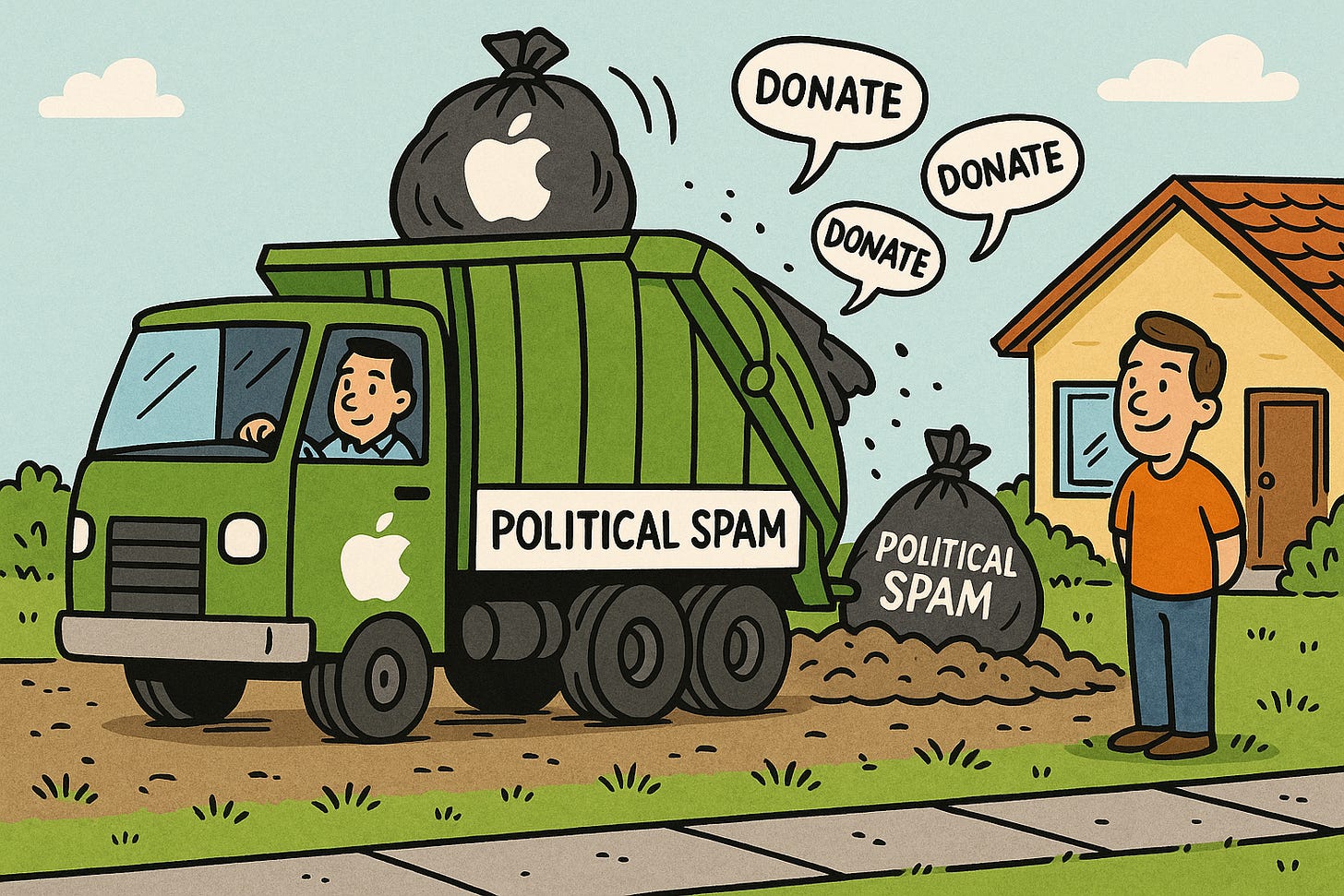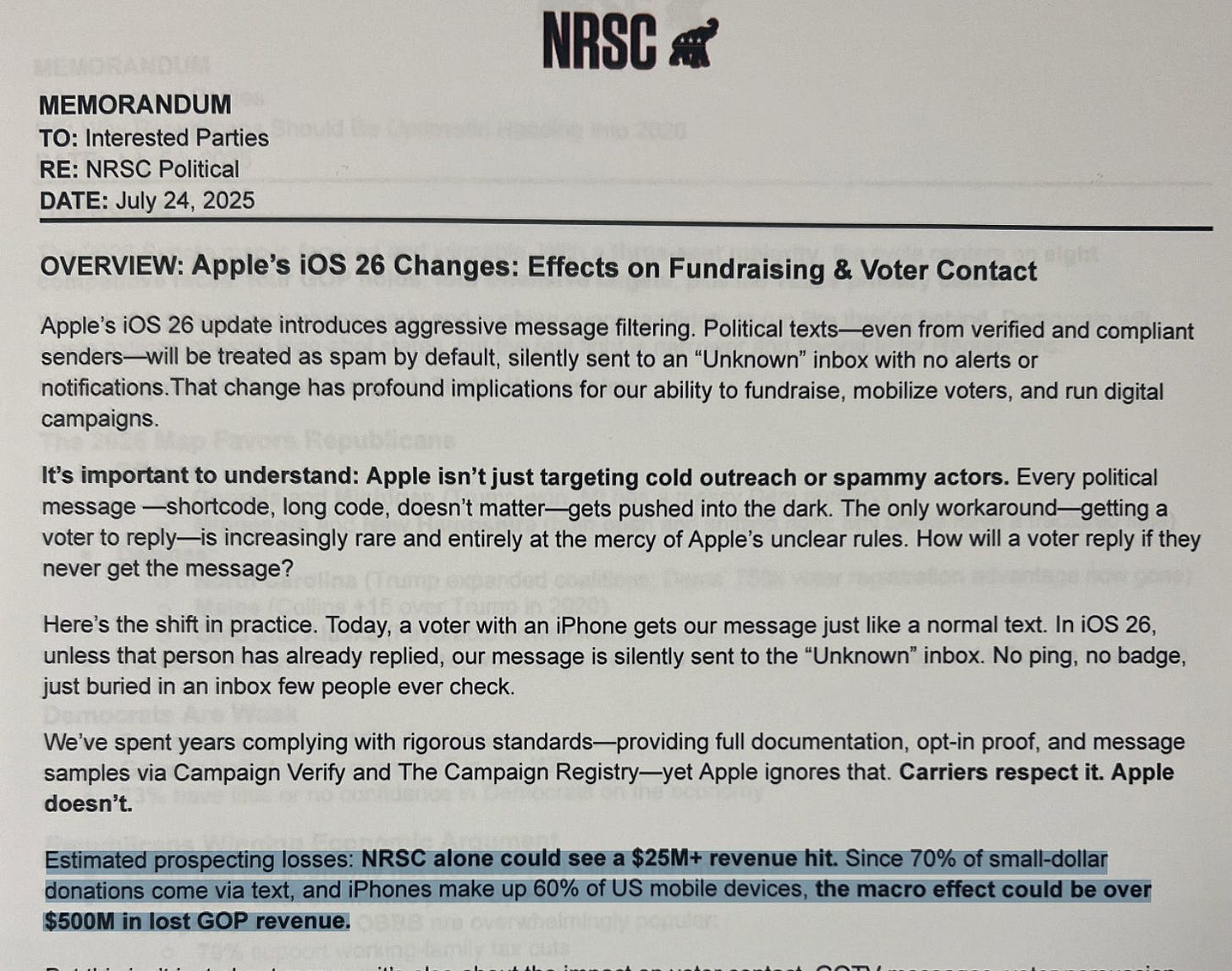Silencing the Spam: Apple’s Bold Move to Curb Unsolicited Texts (Which Includes Political texts!)
A new iOS 26 feature, announced in June and set for a September release, filters unsolicited messages, relieving us from relentless campaign spam.
I usually write about politics and policy, but this column is more about political technology and something coming that is worth celebrating if you hate SPAM coming to your phone!
A Game-Changing Announcement
In June, Apple dropped some welcome news at WWDC—a new iOS 26 feature that finally addresses the tsunami of junk texts flooding our phones. The “Screen Unknown Senders” filter is slated to arrive in mid-September, and it works by routing messages from unfamiliar numbers straight into a separate folder where they belong: out of sight and out of mind. You have to turn it on yourself through Settings > Apps > Messages, which is precisely how it should be—no company forcing features on users without their consent. While Apple already had some filtering capabilities, this new tool takes a harder line, ensuring your main message feed stays clean unless you actively choose to wade into the “Unknown Senders” cesspool. TechTimes and 9to5Mac covered this development in early July, noting that political groups like the National Republican Senatorial Committee are already crying about potential fundraising hits (see their memo at the bottom of this column).
The implications for political campaigns are significant, not only in making it harder for them to reach people with incessant fundraising pitches, but as elections draw near, this same technology will make it very difficult to target voters via text messaging. Hurrah, I say! Good—maybe they will finally respect our privacy.
The Plague of Political Spam
These unwanted political texts have become a modern curse that knows no party lines. Democrats hawking their latest environmental crusade, Republicans pushing their tax relief plans—they all treat our phones like their own campaign megaphones. The Federal Communications Commission has essentially given political texters a free pass by allowing peer-to-peer messaging to sidestep robocall restrictions, creating a legal loophole that campaigns exploit mercilessly. According to Robokiller, Americans received 15 billion political texts in 2022 during the midterm elections, and the volume keeps climbing every election cycle. This constant bombardment feels like digital trespassing for those who value personal boundaries and limited government intrusion.
Opting Out: A Futile Fight
Anyone who has tried escaping political spam knows the frustration of fighting a rigged system. You dutifully reply “STOP” to unsubscribe, only to discover that campaigns operate like shell companies, constantly switching phone numbers and creating fresh contact lists for each message blast. AppleInsider reported last month how this rotation scheme makes opt-out requests virtually meaningless—you might stop one number, but three more pop up in its place. The same organization that promised to remove you from their list mysteriously finds new ways to reach your phone within days. Meanwhile, reporting these violations to 7726 or the Federal Trade Commission accomplishes little since political campaigns enjoy special exemptions from Do Not Call regulations. The deck is stacked against ordinary citizens who want to be left alone.
Hope for Non-iPhone Users
Those stuck with Android devices should not despair—market forces will likely deliver similar relief soon. The smartphone industry thrives on competition, and when Apple introduces a popular feature, rivals quickly follow suit. Samsung and Google control about 40 percent of the American market, according to Statista, and both companies understand that consumer demand for privacy protection continues growing. OnePlus already offers keyword-based blocking tools, while Google’s Messages app provides basic spam filtering. Logic suggests that by early 2026, most major Android manufacturers will roll out comparable features to avoid losing customers to Apple’s superior spam protection.
A Personal Connection
This issue hits close to home for me, just as it does for countless readers dealing with the same digital harassment. My phone regularly buzzes with donation requests from politicians I have never supported, demanding money, over and over and over. Especially since my best friend decided to run for Congress (alas, unsuccessfully) and we wrote him a big check. Apple’s new filtering option represents more than just a technical upgrade—it embodies the privacy principles I have consistently advocated throughout my career. Small victories like this matter because they show that individual consumers can still push back against those who treat our devices like their advertising platforms.
So, Does It Matter?
Apple’s iOS 26 spam filter will not solve every privacy problem but gives users meaningful control over their digital experience. By automatically sorting political spam away from important messages, this feature lets individuals decide what deserves their time and attention. In California, where residents have grown increasingly skeptical of institutional overreach, protecting personal privacy resonates across party lines. As competing manufacturers develop their versions, we can look forward to a future where our smartphones serve our interests instead of campaign fundraisers. Until that day arrives, enabling this filter sends a clear message to political operatives: our attention is not theirs to commandeer without permission. Oh yes, a bonus, Apple steps up the game going after unknown callers too, so you can eliminate answering random unknown political calls, too!
Here’s a short video you can watch about all of this:
Guess Who Doesn’t Like This? People that SPAM you!
And here is a portion of the above-referenced memo from the National Republican Senatorial Committee, that I wish I had never seen. (I’m sure there are similar memos from other mass-senders of unsolicited texts). I think that at a political party that believes in privacy rights for people should applaud free market solutions that protect all people from the scourge of unwanted and unsolicited texts (and the phone-call equivalents). And maybe, just maybe, they wouldn’t be looking at solutions that interfere with voter contact for election purposes if everyone, collectively, was not abusing texting and calls for relentless fundraising, every day, every year. The good news for the NRSC and other political committees lamenting this new empowerment of the over-spammed people is that it will impact everyone equally. A forced armistice of sorts, to the benefit of the poor people living in the texting war-zone. That would be us!




